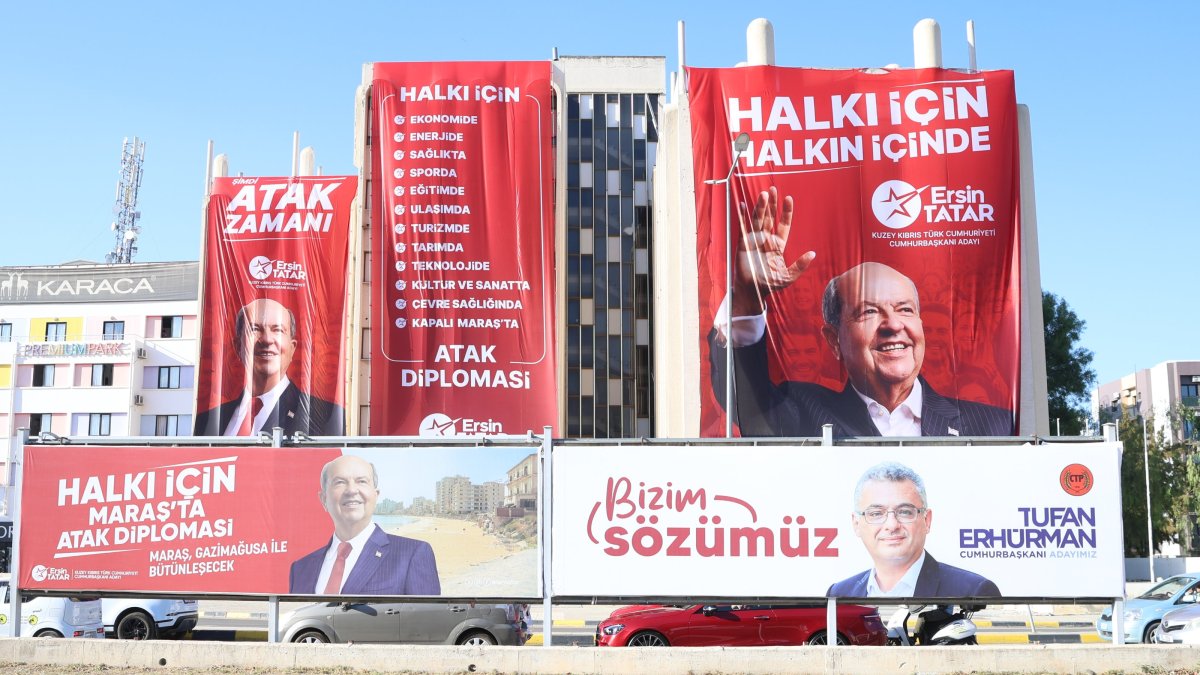The Turkish Cypriot opposition’s campaign, based on a federation system and advocating closer ties with the Greek Cypriot side, is unfeasible and puts Turkish Cypriots at a disadvantage, professor Uğur Özgöker from Arel University said regarding the upcoming elections on the divided island.
Speaking to Daily Sabah, Özgöker criticized the idea of a federation that has proven wrong over the past 52 years, stressing that two independent states can exist on one island, citing examples such as Great Britain – where England and Ireland coexist – the Korean Peninsula, divided into North and South, and the Iberian Peninsula, home to Spain and Portugal.
He stressed that the only practical way for the two sides to agree is to sit down as “two separate states” and negotiate issues such as borders, property exchanges and compensation.
While he found the main opposition leader Tufan Erhürman’s federation ideas “utopic,” he noted that the ideas result in the dismantling of the Turkish presence from the island, Turkish Cypriots being a patch in the European Union and the destruction of Turkish national identity under a Hellenic peninsula.
Referring to the Greek Cypriots who want a Hellenic island where Turks are a minority, he explained: “Even though a left-wing, pro-Greek Cypriot president was elected before, the idea of federation did not work. The Greek Cypriot side is against the idea of an equal partnership with the Turks. The idea of federation should be abandoned.”
Özgöker also warned the young Turkish Cypriots about the Greek propaganda on dismissing the Turkish army from the island and receiving European funds, reminding them of the Greek slaughter of the Turks.
Voters in the TRNC will head to the polls on Oct. 19 to elect a new president. With eight candidates officially in the race, the elections will mainly focus on the incumbent President Ersin Tatar and Erhürman.
While two main candidates, Tatar and Erhürman, race for the presidency, the six other competitors who have also entered the race are Osman Zorba of the Socialist Party and five independents – Ibrahim Yazıcı, Arif Salih Kırdağ, Mehmet Hasgüler, Ahmet Boran and Hüseyin Gürlek.
Reviewing the upcoming elections in the TRNC, he also underlined the Turkish populations in Crete and Western Thrace that have disappeared over the years.
Özgöker also drew attention to the struggle for the TRNC’s recognition by international organizations and states. He praised Türkiye’s key role on the issue, explaining: “Our President Recep Tayyip Erdoğan has great international prestige and reputation. Türkiye is no longer the same; it has become a powerful country. As relations with the Turkic republics and Islamic countries increase, the recognition of the Turkish Republic of Northern Cyprus will also grow.”
According to the Supreme Election Board (YSK), 218,313 citizens are eligible to vote in the first round. Under the electoral system, a candidate must secure more than 50% of the votes to win outright. If no contender reaches that number, the top two candidates will face each other in a runoff within seven days.
The TRNC president serves a five-year term. In the last local elections held in 2022, the number of registered voters was 208,236.
Incumbent President Ersin Tatar, running as an independent backed by the ruling National Unity Party (UBP) and its allies, Democrat Party (DP) and Rebirth Party (YDP), officially launched his campaign under the slogan “Vision: Dynamic Diplomacy” during a rally in Lefkoşa’s (Nicosia) Atatürk Sports Hall.
At the campaign event, these three political parties came together under the name “Common Sense Consensus.” Tatar declared his vision for the next five years, focusing on the two-state solution, international status of the TRNC, economic growth, improved public services and cooperation with Türkiye.
Emphasizing that decades of failed federal talks had run their course and calling for a two-state solution recognizing the political equality of Turkish Cypriots, Tatar said: “Negotiations have been held for more than 60 years on the federal basis for a comprehensive solution in Cyprus. Despite the good intention and sincere efforts of the Turkish Cypriot side, the Greek Cypriot side has many times rejected settlements on a federal basis.”
“The latest examples of these rejections were seen in the U.N. Comprehensive Settlement Annan Plan, which had been rejected by 76% of Greek Cypriots and accepted by 65% of Turkish Cypriots, in the separately held simultaneous referenda in April 2004,’’ Tatar continued.
On the other hand, his main challenger, Erhürman, leader of the main opposition Republican Turkish Party (CTP), pledges to strengthen the engagement with the international community, emphasizing a federation-based solution for the TRNC.
He calls for Turkish Cypriots to reconnect with the world, pushing to end isolation and open new channels of dialogue with international partners.
Erhürman’s campaign also underscores a goal to improve the transparency and efficiency of state institutions and democratic governance. Erhürman advocates a bi-zonal, bi-communal federation with political equality between the island’s two communities, arguing that this model remains the most viable framework for a long-term settlement.
